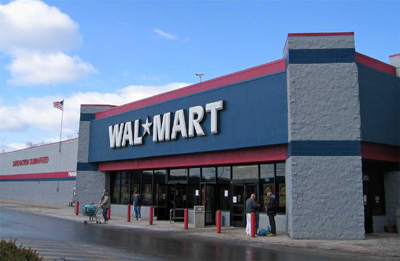Since it owns much of the property its stores are on. The company owns over 1 billion square feet of real estate. A Walmart or Walmart Supercenter typically acts as the anchor store. Whether you shop at that Walmart or not, the company still generates income charging rent to the smaller stores in the plaza that benefit from co-locating with Walmart.
Amazon destroyed much of traditional brick-and-mortar retail, but Walmart stays competitive. Let’s take a deeper look into how that happened.
The Rise and Spread of Walmart
Walmart’s story begins in 1950, when businessman Sam Walton purchased a struggling retail store in Bentonville, Arkansas. He named it Walton’s 5 & 10, and by 1962, the first Walmart store was opened in nearby Rogers. Today, the company employs over 2.2 million people around the world and includes subsidiaries like Flipkart, Vudu, Jet.com, Modcloth, Hayneedle, and Bonobos.
As of its 2019 Annual report, Walmart has 4,769 stores, sells 75 million different products, and generated $514.4 billion revenue for the 2019 fiscal year. When Amazon launched in 1994, Walmart’s annual revenue was $67.344 billion, to give you a better picture of how much it’s grown in that time.
It seems like there was always a Walmart everywhere, but the truth is the brand didn’t have locations in every state until 1995. Vermont was the last state to give in to Walmart that year, only one year after Jeff Bezos started Amazon. It’s still the state with the fewest Walmarts, with only 6, compared to 584 in Texas.
During this aggressive expansion at the turn of the century, Walmart’s real estate division found itself purchasing massive plots of commercial-zoned land to build its Supercenters. The company created a vertically integrated real estate division to handle this. Because it had such massive purchasing power, the company could control pricing in the area. It also controlled its neighbors.
Look at the stores around Walmart - they stay pretty consistent. You won’t see many pawn shops or bars sharing the same parking lot, and that was very much intentional. By controlling these factors, Walmart maintained an aggressive chokehold on local retailers. It seemed as though the juggernaut was unstoppable, until Amazon and ecommerce changed the game.
Staying Alive in a Post-Amazon World With 2020 Vision
The outlook for society in 2020 is a lot different than it was in 2000. Amazon is a far cry from the online bookstore it started as. Jeff Bezos topped the 2019 Forbes list of richest billionaires alive, and Amazon has its own streaming platform (and content studio), smart home platform, web hosting, and is even competing with its own vendors from sellers to carriers like UPS, FedEx, and the U.S. Postal Service.
Walmart slipped to 14 on the chart of the biggest companies in the world in 2019, Amazon is 3, and the vast majority of the list is comprised of tech companies. The biggest battleground in this new business world is in supply chain logistics. Amazon owns Whole Food, along with all the prime locations it has. It’s building new automated centers around the country to offer same-day delivery of a 72-inch TV to your door almost as fast as you can get a pizza.
Walmart went from a dominating juggernaut to one of the only companies around that can compete. It partners with ride-sharing services like Uber and Lyft, along with on-demand delivery services like Postmates, Doordash, and Instacart. Have you noticed when you go to Walmart, there are orange signs both inside and out for Pick Up?
That’s because Walmart is partnering with both customers and third-party logistical services to remain agile against Amazon. Using its real estate footprint and catering to an on-demand gig economy keeps Walmart competing where its competitors dropped the ball.
What You Can Learn from Walmart
Walmart may not be the first brand that comes to mind when you hear the word “underdog,” but that’s exactly what it is. You may think it was always around, but the brand’s aggressive expansion happened within your lifetime. And it’s not Walmart’s famously low prices on in-store products that actually kept the business growing.
It’s the company’s forward-thinking investing in real estate through blanket loans that kept it successful as the Blockbusters, Kmarts, and Robinsons-Mays of the world shuttered. The company aggressively focused on purchasing larger plots of land and using its stores to anchor other businesses. Walmart stores are bigger than those around it by design, and each store sharing a parking lot is likely paying rent to the company’s real estate branch.
If your goal is to use a rental property to retire, it would behoove you to follow Walmart’s lead. While everyone else in the 1990s and 2000s was aggressively investing in dotcom failures like Pets.com, Walmart invested in blanket loans. Brick-and-mortar retail was shrinking, and it seemed like the wrong move.
These days everyone is investing in cryptocurrencies, blockchains, and CBD companies to follow the money. Walmart’s strategy of investing in real estate is still an investment worth making. No matter how successful the gig economy and other digital strategies are, the world is still going to need physical space to house all the data centers and the people running them.


 It’s easy to
It’s easy to